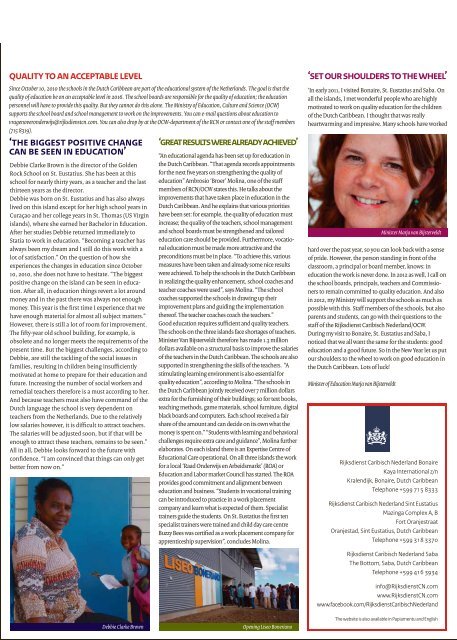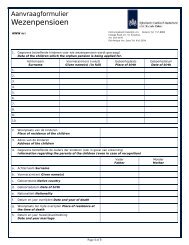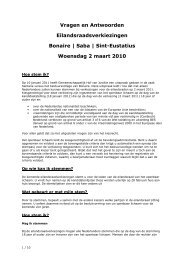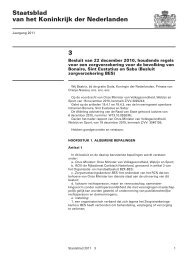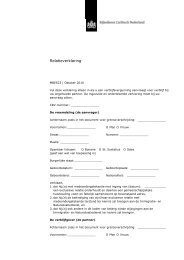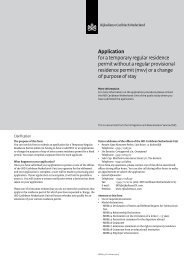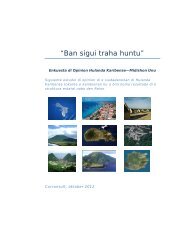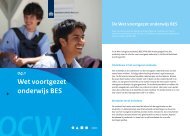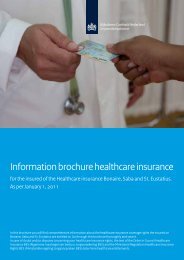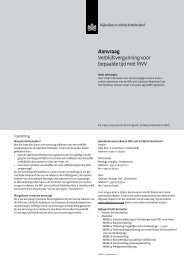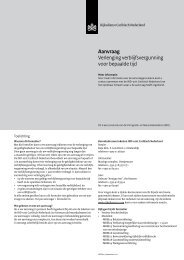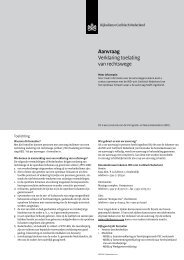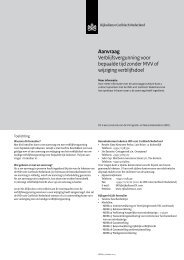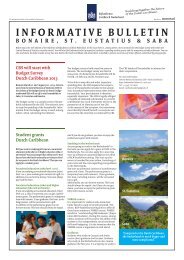aki - Rijksdienst Caribisch Nederland
aki - Rijksdienst Caribisch Nederland
aki - Rijksdienst Caribisch Nederland
You also want an ePaper? Increase the reach of your titles
YUMPU automatically turns print PDFs into web optimized ePapers that Google loves.
QUALITY TO AN ACCEPTABLE LEVEL<br />
Since October 10, 2010 the schools in the Dutch Caribbean are part of the educational system of the Netherlands. The goal is that the<br />
quality of education be on an acceptable level in 2016. The school boards are responsible for the quality of education; the education<br />
personnel will have to provide this quality. But they cannot do this alone. The Ministry of Education, Culture and Science (OCW)<br />
supports the school board and school management to work on the improvements. You can e-mail questions about education to<br />
vragenoveronderwijs@rijksdienstcn.com. You can also drop by at the OCW-department of the RCN or contact one of the staff members<br />
(715 8319).<br />
‘THE BIGGEST POSITIVE CHANGE<br />
CAN BE SEEN IN EDUCATION’<br />
Debbie Clarke Brown is the director of the Golden<br />
Rock School 0n St. Eustatius. She has been at this<br />
school for nearly thirty years, as a teacher and the last<br />
thirteen years as the director.<br />
Debbie was born on St. Eustatius and has also always<br />
lived on this island except for her high school years in<br />
Curaçao and her college years in St. Thomas (US Virgin<br />
islands), where she earned her Bachelor in Education.<br />
Aer her studies Debbie returned immediately to<br />
Statia to work in education. “Becoming a teacher has<br />
always been my dream and I still do this work with a<br />
lot of satisfaction.” On the question of how she<br />
experiences the changes in education since October<br />
10, 2010, she does not have to hesitate. “The biggest<br />
positive change on the island can be seen in education.<br />
Aer all, in education things revert a lot around<br />
money and in the past there was always not enough<br />
money. This year is the first time I experience that we<br />
have enough material for almost all subject maers.”<br />
However, there is still a lot of room for improvement.<br />
The fiy-year old school building, for example, is<br />
obsolete and no longer meets the requirements of the<br />
present time. But the biggest challenges, according to<br />
Debbie, are still the tackling of the social issues in<br />
families, resulting in children being insufficiently<br />
motivated at home to prepare for their education and<br />
future. Increasing the number of social workers and<br />
remedial teachers therefore is a must according to her.<br />
And because teachers must also have command of the<br />
Dutch language the school is very dependent on<br />
teachers from the Netherlands. Due to the relatively<br />
low salaries however, it is difficult to aract teachers.<br />
The salaries will be adjusted soon, but if that will be<br />
enough to aract these teachers, remains to be seen.”<br />
All in all, Debbie looks forward to the future with<br />
confidence. “I am convinced that things can only get<br />
beer from now on.”<br />
Debbie Clarke Brown<br />
‘GREAT RESULTS WERE ALREADY ACHIEVED’<br />
“An educational agenda has been set up for education in<br />
the Dutch Caribbean. “That agenda records appointments<br />
for the next five years on strengthening the quality of<br />
education” Ambrosio ‘Broer’ Molina, one of the staff<br />
members of RCN/OCW states this. He talks about the<br />
improvements that have taken place in education in the<br />
Dutch Caribbean. And he explains that various priorities<br />
have been set: for example, the quality of education must<br />
increase; the quality of the teachers, school management<br />
and school boards must be strengthened and tailored<br />
education care should be provided. Furthermore, vocational<br />
education must be made more aractive and the<br />
preconditions must be in place. “To achieve this, various<br />
measures have been taken and already some nice results<br />
were achieved. To help the schools in the Dutch Caribbean<br />
in realizing the quality enhancement, school coaches and<br />
teacher coaches were used”, says Molina. “The school<br />
coaches supported the schools in drawing up their<br />
improvement plans and guiding the implementation<br />
thereof. The teacher coaches coach the teachers.”<br />
Good education requires sufficient and quality teachers.<br />
The schools on the three islands face shortages of teachers.<br />
Minister Van Bijsterveldt therefore has made 1.3 million<br />
dollars available on a structural basis to improve the salaries<br />
of the teachers in the Dutch Caribbean. The schools are also<br />
supported in strengthening the skills of the teachers. “A<br />
stimulating learning environment is also essential for<br />
quality education”, according to Molina. “The schools in<br />
the Dutch Caribbean jointly received over 7 million dollars<br />
extra for the furnishing of their buildings; so for text books,<br />
teaching methods, game materials, school furniture, digital<br />
black boards and computers. Each school received a fair<br />
share of the amount and can decide on its own what the<br />
money is spent on.” “Students with learning and behavioral<br />
challenges require extra care and guidance”, Molina further<br />
elaborates. On each island there is an Expertise Centre of<br />
Educational Care operational. On all three islands the work<br />
for a local ‘Raad Onderwijs en Arbeidsmarkt’ (ROA) or<br />
Education and Labor market Council has started. The ROA<br />
provides good commitment and alignment between<br />
education and business. “Students in vocational training<br />
can be introduced to practice in a work placement<br />
company and learn what is expected of them. Specialist<br />
trainers guide the students. On St. Eustatius the first ten<br />
specialist trainers were trained and child day care centre<br />
Buzzy Bees was certified as a work placement company for<br />
apprenticeship supervision”, concludes Molina.<br />
Opening Liseo Boneriano<br />
‘SET OUR SHOULDERS TO THE WHEEL’<br />
‘In early 2011, I visited Bonaire, St. Eustatius and Saba. On<br />
all the islands, I met wonderful people who are highly<br />
motivated to work on quality education for the children<br />
of the Dutch Caribbean. I thought that was really<br />
heartwarming and impressive. Many schools have worked<br />
hard over the past year, so you can look back with a sense<br />
of pride. However, the person standing in front of the<br />
classroom, a principal or board member, knows: in<br />
education the work is never done. In 2012 as well, I call on<br />
the school boards, principals, teachers and Commissioners<br />
to remain commied to quality education. And also<br />
in 2012, my Ministry will support the schools as much as<br />
possible with this. Staff members of the schools, but also<br />
parents and students, can go with their questions to the<br />
staff of the <strong>Rijksdienst</strong> <strong>Caribisch</strong> <strong>Nederland</strong>/OCW.<br />
During my visit to Bonaire, St. Eustatius and Saba, I<br />
noticed that we all want the same for the students: good<br />
education and a good future. So in the New Year let us put<br />
our shoulders to the wheel to work on good education in<br />
the Dutch Caribbean. Lots of luck!<br />
Minister of Education Marja van Bijsterveldt<br />
Minister Marja van Bijsterveldt<br />
<strong>Rijksdienst</strong> <strong>Caribisch</strong> <strong>Nederland</strong> Bonaire<br />
Kaya International z/n<br />
Kralendijk, Bonaire, Dutch Caribbean<br />
Telephone +599 715 8333<br />
<strong>Rijksdienst</strong> <strong>Caribisch</strong> <strong>Nederland</strong> Sint Eustatius<br />
Mazinga Complex A, B<br />
Fort Oranjestraat<br />
Oranjestad, Sint Eustatius, Dutch Caribbean<br />
Telephone +599 318 3370<br />
<strong>Rijksdienst</strong> <strong>Caribisch</strong> <strong>Nederland</strong> Saba<br />
The Boom, Saba, Dutch Caribbean<br />
Telephone +599 416 3934<br />
info@<strong>Rijksdienst</strong>CN.com<br />
www.<strong>Rijksdienst</strong>CN.com<br />
www.facebook.com/<strong>Rijksdienst</strong><strong>Caribisch</strong><strong>Nederland</strong><br />
The website is also available in Papiamentu and English


